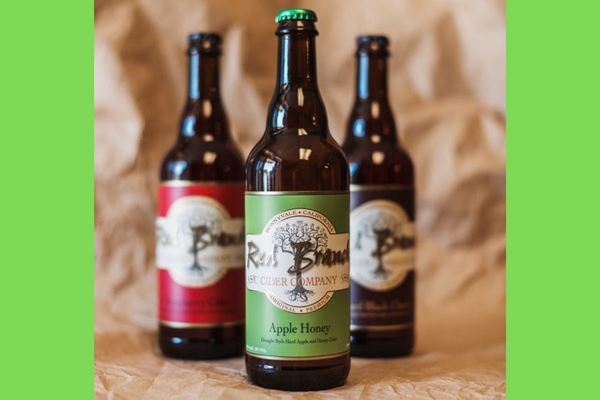
The cider selection at the former Red Branch Cider Co. included an apple honey flavor. (Courtesy Siobhan Siddoway)
There are about 25 breweries in San Mateo and Santa Clara counties, and, as of last month, zero hard cider makers.
Sunnyvale's Red Branch Cider Company, San Carlos' Redwood Coast Cider and South San Francisco's South City Cider have all shuttered recently. While many businesses have faced a hard times, a unique confluence of bad luck and challenging policies have hit these three cidermakers hard, pushing them to halt or relocate operations, leaving the Peninsula bereft of local makers of the apple-based alcoholic beverage.
Red Branch
Michael Faul was one of the region's earliest cider makers, launching Sunnyvale's Red Branch Cider Company in 2001, which offers traditional and seasonal ciders with a honey twist.
It was a wide range of factors that drove the once-successful cidery, which shared space with Rabbit's Foot Meadery, to close on the Peninsula and work toward relocating operations to Sutter Creek, a tiny town in Amador County. But the biggest one was the pandemic, he explained in an email. Going into the pandemic, cider operations had been successfully growing, and even after the first year, he says, "it looked like we might be able to ride it out."
Because of the taproom's location in Santa Clara County – subject to some of the most restrictive COVID-19 policies in the U.S. – they weren't able to open their doors until late 2021, and even then, they could operate only outdoors. Space was limited and they weren't able to set up an outdoor tap room. Without revenue, and despite the help of a federal economic injury disaster loan, he had to let his employees go. When restrictions were finally lifted earlier this year, he advertised six jobs, but they have yet to be filled, he says.
The pandemic also disrupted access to orchards and juice, he adds. The largest cider producers weren't able to get juice and concentrates from overseas, so they took over contracts with U.S. juice companies and orchards, "essentially locking the smaller players out of the market," he says.
"Our local wholesale market dried up during the pandemic, and many have closed, and those that remain are moving towards hard seltzers," he adds.
"We went from a $1 million taproom (with distribution in several states) to $0. …We went from having 250 local wholesale accounts to three, during and after the lockdowns," he explains. "Many businesses closed or reprioritized their taps and a lot of the survivors looking to maintain margins switched to lower cost seltzers."
A major factor affecting cider makers has been the rising popularity of hard seltzer, he says.
"Just go to any Safeway and see how many cider brands are on the shelf, and then count the number of seltzer brands. The space that seltzer occupies was all ciders," he says.
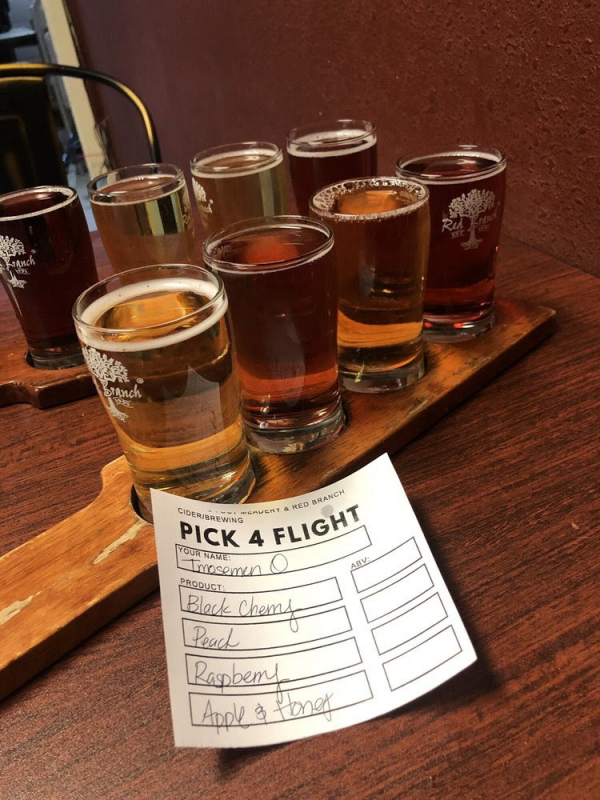
A flight of hard ciders offered at Red Branch Cider Company. (Courtesy Siobhan Siddoway)
The past decade has been a time of rapid change for cidermakers. The popularity of hard cider rose following the East Coast-based Angry Orchard's 2012 launch, after which many large-scale brewers and hundreds of new cider makers joined the industry.
The Craft Beverage Modernization Act passed in 2017 (it was made permanent in 2021), lowering the excise taxes for fermented beverages like beer and hard seltzers. After that, hard seltzer brands exploded on the market and many alcoholic beverage makers started manufacturing them.
"Many who thought that cider would rule for years to come were shocked to discover a fickle consumer, so seltzers took the place of the ciders on store shelves," Faul says.
Ultimately, though, the decision to close and relocate operations was about more than finances. He lost four family members during the pandemic, including his mother-in-law, and he says it's too much to ask his wife to continue the business short-handed. "Life is too short," he says.
He's open to selling the cider brand to someone who can keep it in Sunnyvale, but if not, he's planning to move it to Sutter Creek with the Rabbit's Foot Meadery brand. Everything is for sale, including the building, he says.
The new facility is expected to be operational by February, and they're in the process of adding about 6 new acres of Arkansas Black apples to an existing orchard there to produce a single varietal vintage cider. The new operation will offer specialty small-batch products available online and onsite.
South City Cider
Husband-wife team Alex and Jenn Root Martell, founders of South City Ciderworks, ceased production of their ciders in September after a partnership deal that had been in the works for more than a year with 47 Hills Brewing Company fell through in August.
In Root Martell's podcast "Courage and other C Words" she talks about the challenges and obstacles faced as a woman entrepreneur working in the cider industry and the emotional toll of having to shutter operations.
"In mid-August, we were told out of the blue that the merger that we had put our faith and energy into had in fact fallen through. People on the brewery side refused to sign the paperwork and I was left with a cidery that no longer had a home and no resources and honestly, no energy, to pack it up and move somewhere else to start all over again," she said in the podcast.
47 Hills did not respond to a request for comment by press time.
"Once all the cider is sold into the market, South City Ciderworks will be finished," she said.
Their family now lives in Maine and Root Martell says she's trying to figure out what to do next. "The cider company was so much of my identity for so long that I struggle with seeing what the future holds for me," she said in a recent podcast. "I’m not sure the industry needs someone like me right now. We’re all just barely making it with piling debt and a competitive market."
In the meantime, she plans to continue her podcast, interviewing female businesswomen and entrepreneurs and leaders in cidermaking and other alcohol businesses.
And she's still rooting for others toiling in the cider and alcohol industries. "I salute you and raise a glass. You are an inspiration to those who follow you. And for those of you just starting out, don’t let my situation get you down! There are so many ways to make it work and keep things going. We just weren’t able to, given the circumstances," she says.
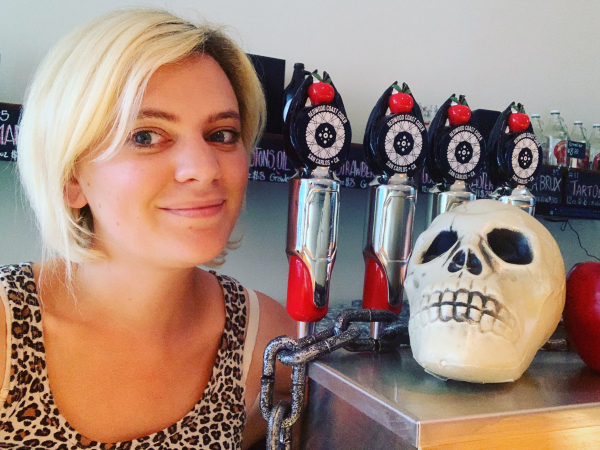
Christina Krzasczak, co-owner at Redwood Coast Cider. (Courtesy Christina Krzasczak)
Redwood Coast Cider
About 13 years ago, Jesse Ferraris and Gabe Lucas, two best friends, started homebrewing cider in their garage. The cider they produced was dry, and had a different flavor profile than the ultra-sweet varieties that were on the market at the time, according to Christina Krzasczak, wife to Ferraris and a co-owner of the business herself.
"Our (cider) was so vastly different," Krzasczak says. "There was absolutely nothing like it on the market," she says. While friends who opened breweries had online courses they could take, equipment lists of what to buy, a formula to follow, they felt like they had to figure out a lot on their own.
"It was really a lot of trial and error," she says.
After they got their first warehouse location in San Carlos, it took about a year before they opened, mainly because of the steep learning curve they faced.
"We did the entire build-out by ourselves," she says. "It took everything we had to get this place open."
Unlike other cideries, they emphasized a direct-to-consumer business model, serving people from their taproom and less so through wholesale distribution. That approach allowed them to be more experimental, she says, and as a result, they developed more than 100 cider flavors during their run. Customers tended to be more accepting of experimentation when their cidertenders could explain how they'd arrived at the flavors, like a bourbon barrel-aged sour cider or a sour cherry lambic.
Their San Carlos warehouse and taproom opened in 2015, and then they opened a separate, auxiliary taproom in San Mateo in October 2019, just months before the COVID-19 lockdowns began the following March.
When the pandemic hit, despite all the uncertainty, Krzasczak says she felt a sense of purpose in working to keep her family's cidery alive.
"I was just able to put my head down and work. It was a very clear path: I need to sell cider," she says. She drove all over the Peninsula four or five days a week, filling and selling growlers of cider to anyone she could.
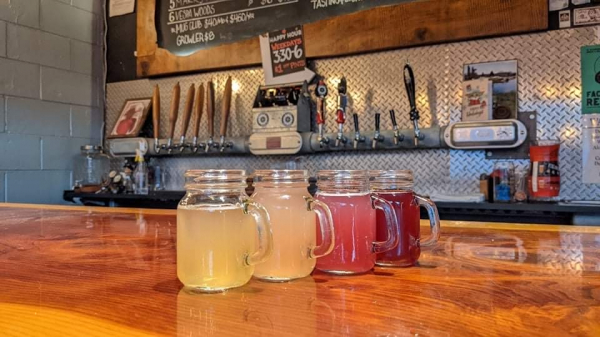
A selection of ciders from Redwood Coast Cider. (Courtesy Christina Krzasczak)
When the cidery was allowed to open for takeout operations, they pivoted to a to-go model, having customers pick up growlers to drink at home and serving cider from the taproom's doorways on the weekends. There was also an interim period of a few months when they were allowed to operate outdoors only, but because guests were not permitted to order at the bar, they had to double their staff count from just a bartender to two people: someone to pour drinks and someone to take orders and deliver them to tables, she adds.
But once restaurants were allowed to open more fully, she says, the delivery model stopped working. "People don't really want to sit at home and drink by themselves if they have the option not to," she says.
While it's generally been a hard time for the craft beverage industry, it's been a uniquely challenging time for cider. The beverage is in a unique position, because it's governed more like wine even though people tend to associate cider more with beer, Krzasczak says.
"We're in this weird gray area," she says. "I always felt like we're the forgotten part of the industry."
One challenge is that at bars, there's usually only one tap, maybe two, set aside for any non-beer alcoholic drinks. Now, cider doesn't just have to compete with other cider brands, but a whole range of other beverages, including hard seltzers, hard kombucha and mixed cocktail drinks. The same goes for space in grocery stores; there's only a limited amount of space for non-beer alcoholic drinks, and it has to be shared with all of the others.
Locally, she adds, there's also the immense pressure that all small businesses in the Bay Area face because of the high cost of real estate. "I think in general, the Bay Area's just not a particularly hospitable place for small businesses right now," she says.
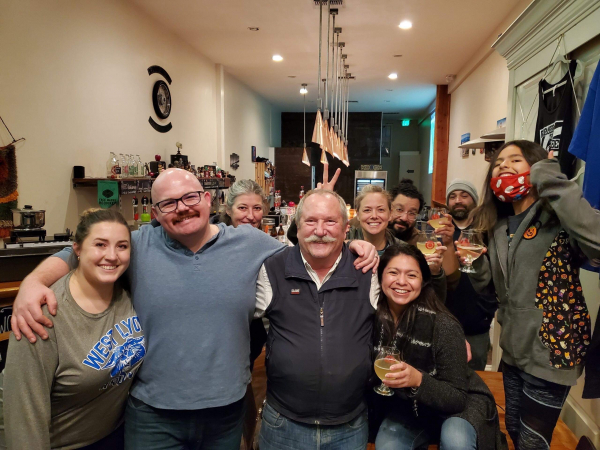
A group of Redwood Coast Cider’s supporters. (Courtesy Christina Krzasczak)
It's like a snake eating its own tail, she says. So many companies want to move to the Bay Area because it's a unique place with cool bars and restaurants, and by opening offices here, they hope to attract cool, interesting people. But in the process of buying land and building offices here, they're displacing the people and businesses that made the area so interesting in the first place. Even commercial landlords who want to help keep small businesses alive are getting offered amounts of money they can't refuse, she says.
"When you get to a certain place in your life and someone offers you life-changing money, you're not gonna say no," she says.
Those community hubs – like what Redwood Coast Cider was to her family and customers, and like the former M Coffee cafe was for her for many years in Half Moon Bay – are somewhere where people of all ages and backgrounds can gather regularly and get to know each other. And they're under threat. "It seems like this is what makes a community a community, versus just a place we all happen to coexist," she says.
And for Redwood Coast Cider, it was ultimately the planned redevelopment of their San Mateo taproom and a rent increase at the San Carlos manufacturing facility and taproom that forced their decision to shut down operations, she says.
"When rent goes above a certain point, you're not going to make any money there," she says.
It's a decision that was made especially difficult because, despite all of the challenges they've faced, Redwood Coast Cider had developed a remarkably close-knit community of customers.
"We have this rabid following of cider drinkers," she says. "They were buying gift certificates that they had no intention of ever fulfilling. They were buying six growlers and dropping them off around their neighborhood for people, not because they had any intention of drinking six growlers, but because they knew we needed to stay in business. They were pre- paying for their mug club memberships."
"Our people went above and beyond….When you have 50 people that just go to bat for you every single week, it's really, really hard to not keep going," she says. "That's the toughest pill to swallow…When I cry over this, it's because I'm going to miss everybody."
And while Krzasczak is planning a new chapter for her family, moving from Half Moon Bay back to her childhood hometown of La Honda and continuing to work as a freelance graphic designer, she's heartened to see a ray of hope in the works for the Peninsula's hard cider fans.
Meredith Kasyan of Moss Beach is working to open a new cider bar, OceanCiders, in Half Moon Bay. It's going to involve a custom trailer with 10 taps, parked next to Half Moon Bay Kayaks in Pillar Point Harbor, with a fire pit and a cozy outdoor seating setup, she explained in a recent interview.

A rendering of OceanCiders, the planned waterfront cider bar at Pillar Point Harbor by Meredith Kasyan. (Courtesy Meredith Kasyan)
She's planning to offer upwards of 30 or 40 cider flavors on offer, including hot ciders and non-alcoholic ones, along with soft-baked pretzels with a cider cheese dip and s'mores. She says she may receive a building permit for the business before the end of the year, which means the location could open as soon as February.
"I think it's going to be a long time before we have another cider producer on the Peninsula," Krzasczak of Redwood Coast Cider says. "But…I'm personally really excited to still have somewhere to go drink cider on the Peninsula, even if it's not my own cider."



